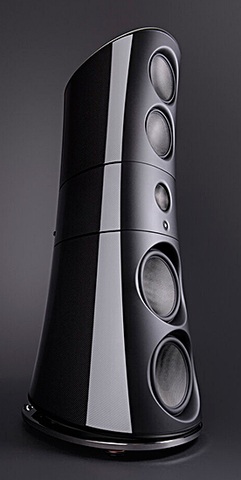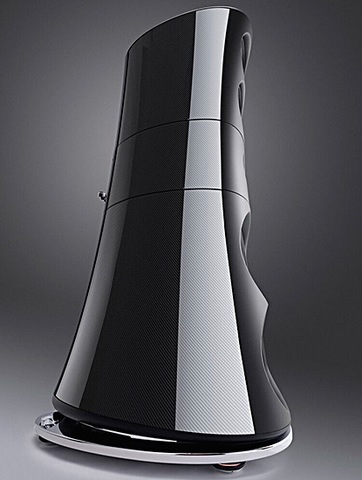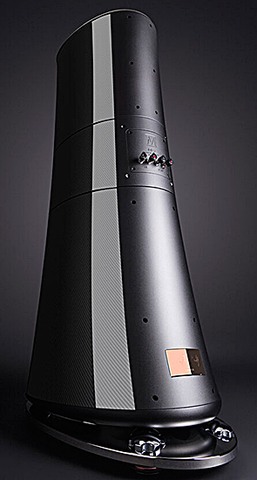
Hayward, CA, USA | 2020 – A summation of our no-holds-barred assault on the limits of dynamic loudspeaker design, the new Magico M9 establishes new benchmarks in musicality, transparency and fidelity. This four-way, six-driver floor standing system features the world’s first loudspeaker enclosure to combine inner and outer skins of carbon fiber with a revolutionary aluminum honeycomb core. Included with the M9 is a state-of-the-art analog outboard active crossover, the MXO. Designed in-house, this carefully crafted unit handles bass/midbass frequency separation. In addition, the M9 benefits from our latest generation of Nano-Tec speaker cones, featuring Aluminum honeycomb cores. The result is a revelation, a loudspeaker that can present intense crescendos with unconstrained power, yet reproduce the most delicate musical passages with transparency and stunning microdynamic detail.
Carbon fiber enclosure with Aluminum honeycomb core
From the very outset, we’ve known that the loudspeaker enclosure must enable sound to pass through completely, without “singing along” with the music. Controlling cabinet vibration without storing energy remains one of the greatest challenges in loudspeaker design. Our quest for the ultimate in enclosures has driven us to pursue the latest in materials science, computerized modeling and meticulous assembly. The M9 represents a new milestone in that journey: the world’s first loudspeaker enclosure with carbon fiber inner and outer skins over an aluminum honeycomb core. This technology reduces overall weight yet doubles the structural stiffness.
The enclosure also incorporates our latest application of constrained layer damping using aerospace composites, plus familiar features of Magico construction including a baffle board of 6061 T6 aircraft aluminum and front-to-back tensioning rods. Through many rounds of Finite Element Analysis modeling, we fine-tuned the enclosure design to suppress resonances and any possibility of stored energy. We also calibrated the organic shape of the enclosure and machined the front baffle to reduce diffraction effects to near zero. Sound waves from the drivers propagate without obstruction. You can hear the difference. The resulting soundfield replicates that of the recording space. Even though the M9 has a commanding physical presence, in sonic terms, it completely vanishes.
New beryllium-diamond dome tweeter
Magico has long recognized that the bending and flexing of non-pistonic motion in a soft dome tweeter leads to large-scale distortion. That’s why we chose the high strength and light weight of Beryllium. And we went even further, enhancing Beryllium with the incredible stiffness of diamond, carefully applied by chemical vapor deposition. This enabled us to go larger, building the world’s first 28 mm Beryllium dome and improving performance without the weight penalty that diamond normally incurs. Now the M9 raises the stakes with an even more refined 28 mm Beryllium-diamond dome tweeter. The new drive unit delivers high-frequency reproduction of extraordinary accuracy, confirmed by Laser Interferometry testing and by careful listening. You’ll hear microdynamics of even greater subtlety, revealing musical detail with even greater clarity.
Eighth generation Nano-Tec cones with Aluminum honeycomb core
Our insistence on diaphragm rigidity and pistonic motion also drove us to offer the world’s first loudspeaker cones with incredibly strong Graphene nanotubes. Every cone in the M9 incorporates our eighth generation Nano-Tec design. With this design, Magico became the world’s first to feature an Aluminum honeycomb core sandwiched between Graphene/carbon fiber skins. In previous Nano-Tec cones, the skins provided all the stiffness and the core provided damping. The Aluminum honeycomb changes everything, providing a core material so stiff that we need to apply 26,500 pounds (12,000 kg) of pressure to shape our 15-inch cones. This added stiffness pushes resonant frequencies far beyond audibility, requiring hardly any damping at all.
Graphene, the hallmark of the Nano-Tec cones, is a hexagonal lattice of carbon just one atom thick. Graphene combines incredible stiffness with the highest tensile strength of any material known to science – some 40 times that of carbon steel. The resulting cone is so rigid that, inverted on the ground, it will not deform after being run over by a sedan. With our eighth generation refinements, this unprecedented strength results in the closest ever approach to pure pistonic motion.

3, 4 and 5-inch voice coils on vented pure Titanium formers
As a cone driver plays intense musical peaks, voice coil temperatures can climb over 100° F (40° C) in a single second. Heating can double the voice coil’s DC resistance, alter the frequency response curve and compress the music as much as 3 dB – a substantial nonlinearity. Magico drivers overcome these distortions. The M9 cone voice coils are huge – 3, 4 and 5 inches in diameter – for much faster dissipation of heat and greater control over the cone. Vents in the voice coil formers provide another level of heat dissipation. We chose formers of pure Titanium for its ideal combination of stiffness and resistance to eddy currents.
Underhung voice coil and oversized Neodymium magnets
The force that the magnetic circuit applies to the voice coil can drop as much as 50% as the voice coil moves away from the central, rest position. This drop-off can be asymmetrical. Motion does not faithfully track the input signal, generating substantial harmonic and intermodulation distortion. Magico Nano-Tec drivers exercise absolute control over voice coil movement by providing underhung voice coils in a magnetic circuit of tremendous power. We use Neodymium magnets with 16 times the magnetic energy per unit volume of Ferrite. In preference to an array of small Neodymium magnets, we select uncommonly large Neodymium ring magnets. As an extra measure against asymmetry, these drivers deploy a matching magnet on top. The result is prodigious flux density, up to 1.7 Tesla (17,000 Gauss), maintained across uncommonly long air gaps, up to 36 mm. This enables distortion-free output up to 120 dB SPL at 1 meter.
- 6-inch midrange driver (x1). The new midrange features a remarkable 4-inch voice coil to help maintain linear output all the way to 120 dB SPL at 1 meter. This results in unmeasurably low distortion throughout the driver’s operating range.
- 11-inch mid bass drivers (x2). This entirely new driver incorporates an N52 grade Neodymium ring magnet of unusual size: 120 mm diameter x 8 mm height, plus a second matching magnet on top for complete control of voice coil movement. It is a new benchmark in linearity.
- 15-inch bass drivers (x2). The new bass driver features a cone molded by 26,500 pounds of pressure. An uncommonly long 36 mm air gap facilitates tremendous linear excursion, ±15 mm, at high sensitivity. You hear the lowest three octaves of bass with full extension and no mid-bass exaggeration.
From cone materials to voice coils to magnetic circuits, each one of these features improves linearity and reduces audible distortion. Taken together, they represent the literal state of the art. These are the most advanced dynamic drivers ever made.
As always, we simulate, optimize, test and re-test every driver design with the latest Finite Element Analysis tools. Computer testing enables us to simultaneously evaluate acoustical, mechanical, electromagnetic and thermal behaviors. As the driver designs near completion, we conduct the same testing and optimization process on the entire loudspeaker system.
Magico Analog Crossover (MXO)

The 120 Hz crossover frequency between the bass and mid-bass drivers poses a special challenge. At such a low frequency, a passive crossover would require huge inductors and capacitors. Even if the very best parts were auditioned and selected with care, such large circuit elements would incur unavoidable, substantial losses. To overcome this issue, we created an analog, active 2-way crossover, the Magico Analog Crossover or MXO. This substantial component provides steep filter slopes without any sacrifice in signal quality.
The crossover’s meticulous design features Linkwitz-Riley filters to deliver 24 dB per octave slopes at the crossover frequency of 120 Hz. Designed in-house from our own platform, the analog crossover is fully balanced with completely discrete circuitry from input to output. Open architecture accommodates additional filter topologies. Precision step attenuators provide 0.5 dB/step control of each output, using a proprietary technique to ensure purity in the signal path. The external power supply chassis regenerates AC and applies active regulation to every part of the circuitry.
A pair of M9 loudspeakers requires two stereo or four monaural amplifiers.
The M9 tweeter, midrange and mid-bass drivers are controlled by a three-way passive crossover with acoustical target 24 dB-per-octave Linkwitz-Riley filters. Magico’s elliptical symmetry crossover design preserves maximum frequency bandwidth with minimal IM distortion.

SPECIFICATIONS
Driver complement:
1.10-inch diamond coated Beryllium tweeter (x1)
6-inch Gen 8 Magico Nano-Tec cone with Aluminum honeycomb core (x1)
11-inch Gen 8 Magico Nano-Tec cones with Aluminum honeycomb core (x2)
15-inch Gen 8 Magico Nano-Tec cones with Aluminum honeycomb core (x2)
Sensitivity: 94 dB
Impedance: 4 ohms
Frequency response: 18 Hz – 50 kHz
Power handling: 20 W (min) to 2000 W (max)
Dimensions:Loudspeaker: 80” H x 40” D x 20” W (203 x 102 x 51 cm)
Crossover: 8” H x 18” D x 20” W (20 x 46 x 51 cm)
Crossover power supply: 8” H x 18” D x 20” W (20 x 46 x 51 cm)
Weight:
Loudspeaker: 1000 pounds (454 kg) each
Crossover: 40 lbs. (18 kg)
Crossover power supply: 60 lbs. (27 kg)
Suggested US Retail Price: $750,000/pair
Ship date: Q4 2020





